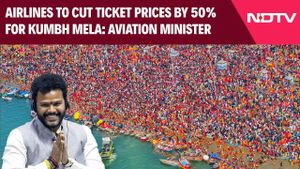India and the United States are currently finalizing plans for Prime Minister Narendra Modi's much-anticipated visit to Washington, expected shortly after the AI Action Summit set for February 10-11. This visit signifies not just the personal rapport between Modi and U.S. President Donald Trump but likewise aims to solidify the ever-important India-U.S. strategic partnership.
Details surrounding the dates of the visit remain under wraps, as confirmed by Indian Ministry of External Affairs spokesperson Randhir Jaiswal on Friday. Following his recent telephone conversation with President Trump, PM Modi described the U.S. leader as his "dear friend" and emphasized their shared commitment to promoting global peace, prosperity, and security. The dialogue also touched upon significant matters, including the potential for collaboration on pressing global issues like regional stability.
"Prime Minister Modi and President Trump had a telephone conversation some days back. The two sides have been working on an early visit of the Prime Minister to the United States," Jaiswal reported. This phone conversation happened on January 27, marking the second such interaction following Trump's re-election. It highlights the strong relationship between the two nations, particularly as Modi is expected to be one of the first foreign leaders to meet Trump during his second term.
The White House has reiterated its commitment to enhancing what President Trump has termed the "great partnership" with India. This visit is not merely ceremonial; it is expected to pave the way for discussions on several key issues, including trade tariffs and other areas of mutual concern. Former Foreign Secretary Harsh Vardhan Shringla noted the importance of the visit to advance ties between India and the U.S., particularly with the upcoming Quad Summit, which India will host later this year.
According to Shringla, "With the strong personal bond between the two leaders, this visit is expected to smooth over issues like tariffs." India has been concerned about tariffs imposed on various goods, which could impede the free trade progress both nations strive for. Indeed, both leaders' historic interactions during events such as 'Howdy Modi' and 'Namaste Trump' serve as evidence of the strong chemistry they share.
The upcoming bilateral discussions will also take place against the backdrop of significant domestic developments within India. Finance Minister Nirmala Sitharaman recently announced plans to amend nuclear liability laws and set up a Nuclear Energy Mission with an outlay of Rs 20,000 crore during the presentation of India's Union Budget for 2025-26. These moves are seen as preparatory steps to align India's nuclear energy policy with global standards and facilitate cooperation with the U.S. on energy security and technology.
"This visit will strengthen the India-U.S. strategic partnership," noted relevant sources involved in the discussions. The broader goal of this partnership is not just economic; it also encompasses regional stability and security, especially considering the changing geopolitical climate marked by tensions and challenges arising from areas like West Asia and the situation involving Ukraine.
The significance of PM Modi's U.S. visit cannot be overstated. Relations between India and the United States have evolved dramatically over the last two decades, increasingly viewed through the lens of strategic cooperation rather than merely trade or diplomacy. The conversations between Modi and Trump aim not only to reinforce this long-standing friendship but also to tackle challenges head-on as they arise.
It's clear from these developments, particularly the emphasis placed upon the upcoming AI Action Summit and the significance of global security discussions, just how pivotal this visit will be. The interdependence felt between both nations has grown, and with it, the expectation for collaborative responses to global challenges.
The India-U.S. partnership—backed by collective interests and shared democratic values—continues to flourish, reflected strongly in PM Modi's planned visit. With the backdrop of substantial policy changes on civil nuclear liability and resource-sharing, this visit signifies not only good relations but is symbolic of greater aspirations for both nations working together on larger platforms.
Stay tuned for more updates as PM Modi’s U.S. visit develops, and as diplomatic relations continue to evolve, setting the stage for future opportunities for both India and the United States.



